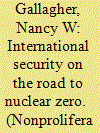| Srl | Item |
| 1 |
ID:
054197


|
|
|
|
|
| Publication |
London, Frank Cass, 1998.
|
| Description |
175p.
|
| Standard Number |
0714646637
|
|
|
|
|
|
|
|
|
|
|
|
Copies: C:1/I:0,R:0,Q:0
Circulation
| Accession# | Call# | Current Location | Status | Policy | Location |
| 040145 | 327.174/GAL 040145 | Main | On Shelf | General | |
|
|
|
|
| 2 |
ID:
105208


|
|
|
| 3 |
ID:
144293


|
|
|
|
|
| Summary/Abstract |
Since the end of the Cold War, arms control proponents tried to make the case for deep nuclear reductions and other forms of security cooperation as necessary for strategic stability. While different versions of strategic stability analysis did sometimes produce innovative proposals, constructive negotiations, and successful ratification campaigns in the past, this analytical framework has become more of a hindrance than a help. Treating arms control as a predominantly technical way to make deterrence more stable by changing force structure characteristics, military operations, relative numbers of weapons on either side, or total number of nuclear weapons gives short shrift to political factors, including the fundamental assumptions about world politics that inform different arms control logics, the quality of political relations among leading states, and the political processes that affect negotiation, ratification, and implementation. This article compares two logics for arms control as a means to enhance strategic stability, one developed by the Cambridge community in the 1960s and one used by the Reagan administration and its successors, with current perspectives on strategic stability in which flexibility and freedom of action are preferable to predictability and arms control. It also contrasts what the Barack Obama administration has tried to achieve through strategic stability dialogues with Russia and China with how they envision security cooperation. It then presents an approach developed during the Cold War by Hedley Bull for thinking about both the technical and the political dimensions of arms control, and suggests that the logic of Cooperative Security (which shares important features with Bull's approach) is a more appropriate and productive way to think about arms control in the twenty-first century than strategic stability analysis is.
|
|
|
|
|
|
|
|
|
|
|
|
|
|
|
|